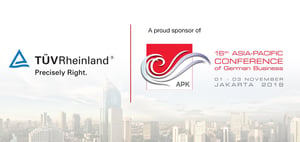
TÜV Rheinland, the global leader in testing, inspection, and certification services, is once again represented as the Platinum sponsor, at the Asia-Pacific Conference of German Business (APK) in Jakarta, Indonesia (16th Edition), held between 1st to 3rd November 2018. This year, TÜV Rheinland will showcase its expertise in helping companies in Asia Pacific, especially Indonesia, level up their capabilities to be ready for all the business opportunities presented by Industry 4.0 via digital transformation.
Leading the delegation is Dr. Fubi (Chairman of the Executive Board of Management, TÜV Rheinland AG), together with Mr. Ralf Scheller (Chief Operating Officer, TÜV Rheinland AG), Mr. Andreas Hoefer (Executive Vice President Asia Pacific/India, Middle East & Africa, TÜV Rheinland AG), Mr. Holger Kunz (Executive Vice President Product, TÜV Rheinland AG) and Mr. Nyoman Susila (Managing Director, TÜV Rheinland Indonesia), are also present to engage with the participants. This signature German business event is held in the Asia Pacific region every two years, with the last edition in Hong Kong. Apart for networking opportunities for stakeholders from both the private and public sectors, it is an important platform for business leaders, executives and government representatives to engage in robust discussion with the goal to achieve positive economic and business outcomes in the best interests of Germany and Asia Pacific.
“APK 2018 is the leading German business event in Asia Pacific, the high ranking business executives and government representatives of both sides are represented here,” said Dr Fübi, Chairman of the Executive Board of Management, TÜV Rheinland AG. “I am delighted that we are able to present the participants with exactly the groundbreaking solutions and technologies that customers expect from us, and support them to embrace Industry 4.0.”
As the people enjoy the benefits of wireless Internet of Things (IoT) and Industrial Internet of Things (IIoT), we cannot ignore their risks. The frequency, scope and sophistication of cyber-attacks have reached new highs in 2016. This demanded a response from various industries for solutions to safeguard central supply systems, secure automated data exchange and ensure the availability and reliability of production systems. Apart from the integration of functional safety to protect businesses from technological failures and classic cyber security incidents, there is also a pertinent need to secure the process automation and controls to prevent system faults.
“Not only do we want to achieve better efficiency and lower costs for organizations, we also wanted to enable the data, networks and production systems of our clients to be secured too,” Mr Ralf Scheller, Chief Operating Officer, TÜV Rheinland AG, emphasized. He added, “We do this through a range of services including consulting, solution design, implementation, testing and Industrial Control Systems (ICS) certification provided to critical infrastructure operators, manufacturers, plant engineers and exchange to exchange system integrators globally.”
To successfully navigate the new world of Industry 4.0, the following approaches can be considered:
1. Build up capabilities to have a deeper understanding of both classic IT and industrial processes. With these expertise at your disposal, one will be able to synergize and arrive at actionable recommendations in a systematic manner.
2. Institute higher security standards for devices, systems and components across the organization, and align them to industrial standards, which are likely to be future pre-requisites, via certifications.
3. Encourage proactive and voluntary strategic initiatives from the companies to level up system security at an organizational level, in addition to mandatory security measures from the Government.
4. Take the approach of “Security by Design” as early as the design phase, whereby components and systems are screened for potential vulnerabilities. This will allow risks to be avoided entirely or detected early to be eliminated prior to product commissioning.
5. Build up a “security-centric” human capital within the organization by providing holistic training for future generations of designers and engineers, early and continuously, make for the best defense.
With over 145 years of experience in industrial safety and nearly 20 years in cyber security, TÜV Rheinland is in a position of strength to provide support in this unfamiliar terrain. The company’s goal is to secure digital transformation processes while maintaining compliance with international standards. The region of Asia, Middle East & Africa is TÜV Rheinland’s largest market, outside of Germany. As a strong backer for trading and economic development between Asia and Germany, TÜV Rheinland strive to be known as the proponent to achieve sustained development of safety and quality, in order to meet the challenges arising from the interaction between man, technology, and the environment.
TÜV Rheinland has been active in the Indonesian market since 1980. After establishing office in Jakarta in 1996, TÜV Rheinland Indonesia has launched homologation business agreement for automotive component in 1998 and received accreditation from KAN for SNI certification (LSPr-026) in 2009. Three years later, TÜV Rheinland Indonesia established electricity safety lab and wheel laboratory in 2012. Recently, it has launched the first independent tire testing laboratory in Indonesia, located in Taman Tekno BSD, South Tangerang.


